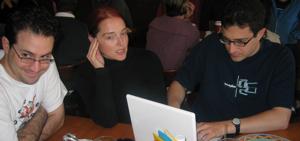Tantek == Spanking?
Published 22 years, 3 months past
The title of the post exists mostly because I vowed in a public setting to use it, but there is a story behind it. I just don’t remember the details right now, because it happened more than 24 hours ago and I’m very tired. I remember that a small group had gathered at Crepes on Cole for brunch yesterday, and the conversation kept veering wildly from highly geeky to very much the opposite.
 At some point, the subject of Tantek being in trouble (for a comment? an action? a bug in IE/Mac?) came up, and it was asserted that he needed to be spanked. (“Oh, yes, yes! A spanking! A spanking!”) Then it was observed that we should probably check first with his girlfriend to see if that was acceptable. So I turned to her and said, “So, is it okay with you if we spank him?”
At some point, the subject of Tantek being in trouble (for a comment? an action? a bug in IE/Mac?) came up, and it was asserted that he needed to be spanked. (“Oh, yes, yes! A spanking! A spanking!”) Then it was observed that we should probably check first with his girlfriend to see if that was acceptable. So I turned to her and said, “So, is it okay with you if we spank him?”
Her reaction was so priceless (and his nearly as amusing), I ended up teasing both of them about it several times, and I wasn’t alone in the effort, either. She never did answer the question, so we still don’t know where she actually stands on the subject. It was a weird day. Relaxing, but weird. Early on we were discussing relationships and the subject of polyamory came up. I speculated that the increasing practice of polyamory might be linked to the rising incidence of attention-deficit disorder. It’s so crazy, it just might make sense.
Pretty much the opposite of ADD is the viewpoint espoused by the Long Now Foundation, which aims to get people thinking about the next ten milennia as opposed to the next ten minutes. Tantek and I met up at the Herbst Pavilion to see Brian Eno give a free talk on the Long Now, and there turned out to be an even Longer Line. With space for 700, and probably 750 in the hall by the time they closed the doors, there were very likely three or four times as many people in line as were eventually admitted. The talk itself was interesting, and Mr. Eno’s presentation style was done in such a calm, deliberate, paced manner that I felt a little more in touch with the Long Now by the time we left, which may or may not have been done on purpose. The instant the talk was over, Tantek and I headed out a side door and toward the parking lot at a jog so we could the crowd to their cars; we had no desire to get stuck in a traffic jam trying to leave. This would be ironic except for the statement I remember from the presentation, that the Long Now perspective is meant to make the world “safe for hurry” by slowing other parts of life a long way down. So we hurried safely, and benefitted from the effort. Yay us!
In many ways, I’m intrigued with and approving of the Long Now concept. If we as a society could take more of a long-term view, we might make different (and hopefully better) choices about how we relate to our surroundings. If you knew that you’d be around for five centuries, how would you live your life differently? If you knew humanity would occupy the Earth for the next ten milennia, how might that alter your patterns of behavior? I’ve generally lived my life employing a long-term perspective, but the longest term I employ tends to be my lifetime. While I might plan for retirement and how I’ll pay for the education of children I don’t even yet have, I don’t generally make plans that are centered on my great-great-grandchildren, because I will almost certainly never live to meet them. Does that make them any less real, or worthy of consideration? Maybe it does, but even the act of deciding that will require a longer view than I usually take.
Clay Shirky’s recent essay on the Semantic Web has stirred enough attention that I had non-techie friends forwarding me the URL. I found it interesting, especially since over the last few months I’ve been working with a few sharp people on a way to address one of the points Clay touched upon. We’re almost ready to make our work public, so watch this space for details as well as an addition to this page.